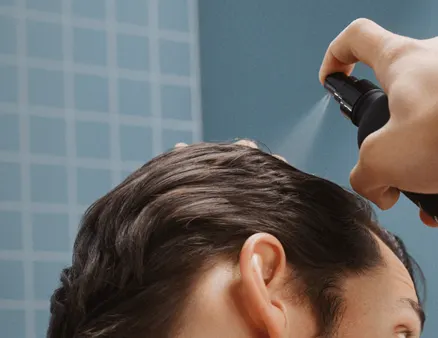Here's what we'll cover
Here's what we'll cover
Here's what we'll cover
If you’ve recently started taking Wellbutrin and have started to notice more hair than usual in your shower drain or brush, you might wonder if there’s a connection.
Losing a little hair every day is normal and expected, but more than that might make you concerned. Is it going to stop? Will it grow back?
Fortunately, this hair thinning is likely only temporary. Wellbutrin hair loss is an infrequent and typically short-lived occurrence. This is what we know about the cause and how you can cope with it.
Does Wellbutrin cause hair loss?
It is possible that Wellbutrin may sometimes cause hair loss.
While researchers did not find that Wellbutrin caused hair loss in the drug’s initial clinical trials, hair loss or alopecia was reported as an infrequent side effect—meaning it didn’t happen often—after healthcare providers started prescribing Wellbutrin to the public (GlaxoSmithKline, 2017).
People taking other types of antidepressants have also occasionally reported hair loss. Both selective serotonin reuptake inhibitors (SSRIs), such as Prozac (fluoxetine; see Important Safety Information), Paxil (paroxetine, see Important Safety Information), and Zoloft (sertraline; see Important Safety Information), and serotonin-norepinephrine reuptake inhibitors (SNRIs) such as Effexor (venlafaxine; see Important Safety Information) have been noted to have a risk of hair loss (Tirmazi, 2020).
What is Wellbutrin used for?
Wellbutrin (bupropion; see Important Safety Information) is an antidepressant medication first approved by the Food and Drug Administration (FDA) in 1985.
The current FDA approved uses for Wellbutrin are (Huecker, 2021):
Depression in adults
Smoking cessation
It’s also frequently used “off-label” (used for conditions that haven’t been approved by the FDA) for other physical and mental health conditions such as (Huecker, 2021):
Anti-depressant-induced sexual dysfunction
Attention-deficit/hyperactivity disorder (ADHD)
Depression associated with bipolar disorder
Obesity
In clinical trials, several potentially serious common side effects have been associated with Wellbutrin. The most serious of these are a lowered seizure threshold (meaning you may be more likely to have a seizure) and having suicidal thoughts (Huecker, 2021).
Bupropion and hair loss: why does it happen?
Medical researchers don’t completely know why some people experience sudden Wellbutrin hair loss, but they have a theory.
The medical term for sudden hair shedding that doesn’t leave scarring on the skin is telogen effluvium. It results from the shifting of the hair cycle growth (anagen) phase to the shedding (telogen) phase. While some hair shedding is normal, in telogen effluvium, more hair than usual enters the resting and shedding phases (Hughes, 2021; Al Aboud, 2021).
Typically, your hair follicles grow hair for about four years, rest for about four months, and then a new hair pushes the old hair out. This accounts for the small number of hairs you normally find in your hairbrush or shower drain each day (Hughes, 2021).
If there is sudden stress on the body, up to 70% of the growing hairs can switch to the telogen phase earlier than usual. This results in more hair falling out at once (Hughes, 2021).
Is telogen effluvium common?
Researchers think that telogen effluvium is quite common.
Episodes can occur in people of any age, gender, or racial background. A large portion of adults will experience an episode of telogen effluvium at some point in their lives, though women are more likely to be distressed by it and tell a healthcare provider (Hughes, 2021).
There are several reasons you might go through an episode of telogen effluvium. They include (Hughes, 2021; Al Aboud, 2021):
Medication side effects
Thyroid problems
Severe stress
Major surgery
Poor diet/ sudden weight loss
Substance abuse
Recent illness
Is Wellbutrin hair loss permanent?
In most cases, Wellbutrin hair loss is not permanent.
Excessive hair shedding episodes usually last less than six months and are often much shorter. They are typically caused by acute stress on your body. This can be an illness, mental stress, or, in this case, a new medication (Hughes, 2021).
There also may be a delay between when the stress occurs (i.e., when you start taking a new medication) and when you first notice the hair loss.
Typically, looking at your medical history will reveal a cause that occurred between one and six months before the shedding was noticed. However, that delay can sometimes make it difficult to see the connection with your hair loss (Hughes, 2021).
The good news is that sudden hair loss will typically reverse in time, no matter what the cause. When your body recovers from that recent stress or change, your hair will start growing again.
How common is hair loss with Wellbutrin?
Hair loss is a possible side effect of Wellbutrin, but it is not common.
In fact, it’s so uncommon that during its initial clinical trials, when compared to those taking the placebo, not even 1% of people taking Wellbutrin experienced alopecia (GlaxoSmithKline, 2017).
And once Wellbutrin was made available to the public, it was only reported as an “infrequent” side effect, meaning that fewer than 1 in 100 but more than 1 in 1000 people who take Wellbutrin will experience hair loss (GlaxoSmithKline, 2017).
How to stop hair loss from Wellbutrin
If you think Wellbutrin is causing your hair loss, do not stop taking your antidepressant without talking to your healthcare provider first. Doing so means you might experience a return of your depression or, occasionally, withdrawal symptoms, so it’s important to follow your provider’s medical advice when weaning off of the drug.
Acute hair loss is usually temporary and will stop on its own. Your provider may want to check you for other causes of sudden hair loss, such as (Hughes, 2021):
Hormonal imbalance
Metabolic problems
Thyroid problems
If another medical reason besides Wellbutrin is at play, your hair loss will likely stop when that condition is treated (Hughes, 2021).
Medications aren’t usually needed for hair loss caused by Wellbutrin but can be considered a treatment option in severe cases. Topical minoxidil (Rogaine) hasn’t been proven to promote hair growth in telogen effluvium. However, it has helped with hair regrowth in other conditions (Hughes, 2021).
Oral Minoxidil Important Safety Information: Read more about serious warnings and safety info.
How to cope with bupropion hair loss
While Wellbutrin hair loss isn’t life-threatening, it can still stress you out. Remember that it’s usually temporary and is typically a subtle all-over hair loss that isn’t as visible to others as some other types of hair loss (Phillips, 2017).
Some ways to make thinning hair less noticeable include:
Try different hairstyles
Wear a headscarf or bandana
Wear a hat
Look into hairpieces or wigs
If your Wellbutrin hair loss doesn’t seem to improve after a few months, you can talk to your healthcare provider about trying a different antidepressant medication. You might experience less hair loss with another class of antidepressant medication (Phillips, 2017).
DISCLAIMER
If you have any medical questions or concerns, please talk to your healthcare provider. The articles on Health Guide are underpinned by peer-reviewed research and information drawn from medical societies and governmental agencies. However, they are not a substitute for professional medical advice, diagnosis, or treatment.
References
Al Aboud, A. M. & Zito, P. M. (2021). Alopecia. StatPearls . Retrieved Apr. 5, 2022 from https://www.ncbi.nlm.nih.gov/books/NBK538178/
GlaxoSmithKline. (2017). Wellbutrin: highlights of prescribing information . Retrieved from https://www.accessdata.fda.gov/drugsatfda_docs/label/2017/018644s052lbl.pdf
Huecker, M. R., Smiley, A., & Saadabadi, A. (2021). Bupropion. StatPearls . Retrieved Apr. 5, 2022 from https://www.ncbi.nlm.nih.gov/books/NBK470212/
Hughes, E. C. & Saleh, D. (2021). Telogen Effluvium. StatPearls . Retrieved Apr. 5, 2022 from https://www.ncbi.nlm.nih.gov/books/NBK430848/
Phillips, T. G., Slomiany, W. P., & Allison, R. (2017). Hair loss: common causes and treatment. American Family Physician, 96 (6),371-378. Retrieved from https://www.aafp.org/pubs/afp/issues/2017/0915/p371.html
Tirmazi, S. I., Imran, H., Rasheed, A., et al. (2020). Escitalopram-Induced Hair Loss. The Primary Care Companion for CNS Disorders , 22 (4), 19l02496. doi:10.4088/PCC.19l02496. Retrieved from https://pubmed.ncbi.nlm.nih.gov/32589827/












